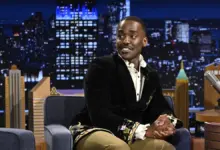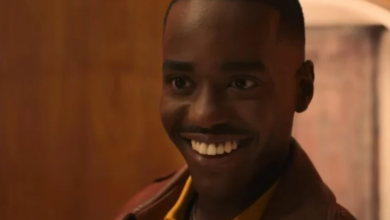Doctor Who’s Martha Jones was ahead of her time
Celebrating an often overlooked companion.
It was always going to be difficult for the companion who followed Rose Tyler (Billie Piper) in Doctor Who.
She stole the Doctor’s hearts, captured our own and provided the benchmark alongside David Tennant for the contemporary take on this well-known double act. Then in strolled a bright young medical student, Martha Jones (Freema Agyeman).
From her debut in Smith and Jones, Martha was introduced as the Doctor’s equal, who shared his drive and dedication to protect and help others. Brimming with intelligence, charm and compassion, Martha was a refreshing new presence on the show after the emotional turmoil at the end of season 2.
The only snag in this promising new alliance was that, midway through their whirlwind adventure to defeat the Judoon (and return her hospital back from the moon), the Doctor kisses Martha.
It almost became a rite of passage with newcomers on the show to lock lips with the Doctor in the heat of the moment, after he had a snog with Reinette (Sophia Myles) in Girl in the Fireplace and later a peck with Kylie Minogue in Voyage of the Damned.
Though, who are these mere mortals to refuse the lure of a Time Lord in a pinstriped suit?
This time, though, the kiss spoils their budding friendship, as it misleads Martha into thinking that their relationship could develop into something romantic. Rapidly, her small crush snowballs into an agonising love, made all the more painful by the Doctor being oblivious to her feelings.
It made their relationship complicated as it altered the power dynamic, which led Martha to fall into an unflattering stereotype of a jealous, frustrated woman who was tired of being overlooked and underappreciated.
After the Doctor falls for a woman he hardly knows, Joan Redfern (Jessica Hynes), in The Family of Blood, she even despairs: “You had to go and fall in love with a human and it wasn’t me.”

It would be easy to glaze over her triumphs, and focus on the extensive screen-time Martha spends pining and whining over the Doctor’s treatment of her. But this would be a disservice to the foundations that Martha Jones established to pave the way for the Doctor’s future platonic partnership with Donna Noble (Catherine Tate).
As others batted their eyelids at the Doctor to get their own way (we’re looking at you, Rose), Martha rarely waited for the Doctor’s instructions and often took charge of the situation.
In one of the most epic three-part storylines, Martha single-handedly defeated the Doctor’s greatest nemesis, The Master, after he decided to play God with planet Earth.
With no TARDIS, Time Lord, sonic screwdriver or allies, Martha set out to spread the word about the Earth’s faceless protector to save his life through the psychic abilities of the Archangel network. In her all-black leathers, Martha took on the typical role of the Doctor – recruiting allies, gathering information and solving the situation without a single weapon or any bloodshed.
Last of the Time Lords consolidated the unrivalled legacy of Martha Jones and established that she was ahead of her time on the series. Though time was rewritten and Martha’s sacrifice and bravery forgotten by the world, it wasn’t by us. It was ironic to me that Martha left the show when, arguably, she’d only just stepped into her full potential.
Yet, when she shared her reason for leaving, my respect for Martha grew exponentially. Martha compares co-existing with the Doctor to a friend’s toxic relationship where a woman spent “years pining after” a man who “never looked at her twice”.
Before she follows her own advice and walks out, she affirms: “I always said to her, time and time again, get out. So, this is me getting out.”
It’s the most empowering moment in Martha’s short-lived time on the show, when she acknowledges that she deserves more than what this man – who has all of space and time at his fingertips – can offer her.
In season four, it’s also clear that this was the right decision. The newly qualified doctor continues to establish her own legacy with UNIT, working to protect Earth from extra-terrestrial threats from the ground. It turns out Martha never needed a TARDIS or a Time Lord for a life of fulfilment or adventure, as she’s cultivated that for herself.
For a woman whose every move was influenced by her love for the Doctor, Martha is now free from the control this unhealthy love had over her. She’s able to become the woman and, of course, the doctor that she was aways striving to be. The Doctor simply lights a fire in Martha to expand her horizons. Think bigger than simply helping one species on one planet.
“I spent all these years training to be a doctor, and now I’ve got people to look after,” Martha tells the Doctor in her heartfelt goodbye, “[My family] saw half the planet slaughtered and they’re devastated, I can’t leave them.”
In stark contrast to Rose, Martha isn’t forced to leave, but she takes charge of her own narrative and departs as the Doctor’s equal. With a melancholic smile, the Doctor hugs her and says, “Thank you,” before he finally acknowledges how remarkable Martha is, and adds, “Martha Jones, you saved the world.”
It will always be a tragedy that Martha was reduced to ‘desperate woman who wanted to be loved’, and that this side of her character often overshadowed her acts of heroism, reduced her power and capped a limit on the banter and thrills that she could enjoy with the Doctor, while harbouring such a deep love for him.
Her reappearance in season four redeems some of this oversight as she strikes up an instant bond with Donna and rejoices for the Doctor when he’s reunited with Rose.
It seems the show simply didn’t know what to do with Martha in 2007, but she broke the mould and became a pivotal figure in the reinvention of the Doctor’s side-kick from a magician’s assistant-style damsel in distress to a formidable force that lessened the Doctor’s burden, and was on hand to help him save the universe.
It turns out, Martha was right all along. As she tells the Doctor: “I spent a lot of time with you thinking I was second best, but you know what? I am good.”


